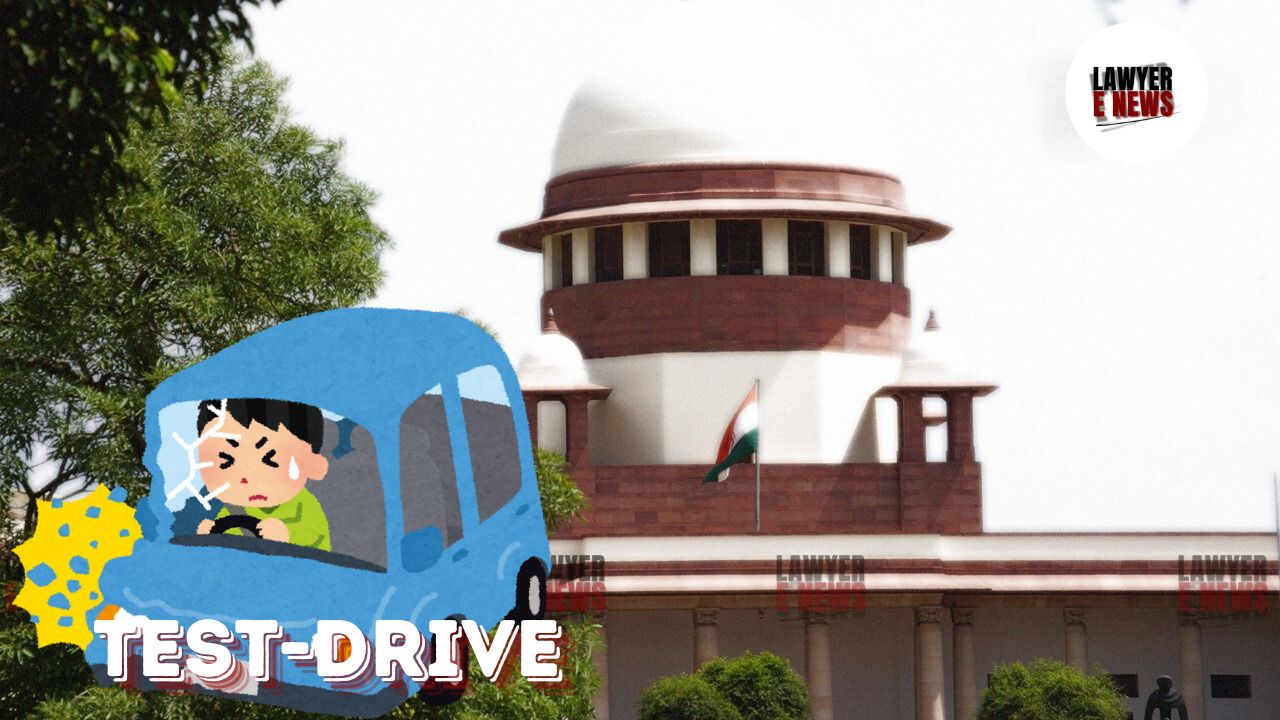-
by Admin
15 February 2026 5:35 AM



Manufacturer Held Solely Liable as Dealership's "Mere Possession" of Vehicle Does Not Constitute Ownership .The Supreme Court has overturned the liability imposed on Vaibhav Jain, the proprietor of a car dealership, for compensation related to an accident involving a vehicle during a test drive. The Court ruled that Hindustan Motors, the manufacturer of the vehicle, should bear full responsibility for the compensation. The judgment emphasizes that the vehicle was under the control of Hindustan Motors' employees at the time of the accident, absolving the dealership from any liability.
The case arose from an accident that occurred during a test drive of a vehicle manufactured by Hindustan Motors and sold to its dealer, Vaibhav Motors. The vehicle was driven by an employee of Hindustan Motors, with another employee of the company as a passenger. The accident resulted in the death of the passenger, leading to a claim for compensation by the deceased's heirs. The Motor Accident Claims Tribunal held both Hindustan Motors and the dealer jointly and severally liable for the compensation.
The Supreme Court examined whether the dealership could be considered the owner of the vehicle at the time of the accident and therefore liable for the compensation. The Court noted that the vehicle was under the control and command of Hindustan Motors' employees, and there was no evidence that the vehicle had been sold to the dealer at the time of the accident. Consequently, the Court concluded that Hindustan Motors, as the owner, was solely responsible for the compensation.
The Supreme Court delved deeply into the concept of ownership under the Motor Vehicles Act, emphasizing that mere possession of a vehicle by a dealer does not automatically impose liability. The Court noted that the crucial factor is the control and command over the vehicle at the time of the accident. In this case, Hindustan Motors retained control since the vehicle was being driven by its employee, and no conclusive evidence was presented to show that ownership had transferred to the dealer. The Court stated, "Ownership for the purpose of liability under the Motor Vehicles Act extends beyond registration to include the entity in control of the vehicle at the time of the incident."
The Court highlighted that the vehicle was being taken on a test drive by employees of Hindustan Motors, not by the dealership staff. The driver and the deceased were both employees of the manufacturer, further reinforcing that the vehicle was under the effective control of Hindustan Motors at the time of the accident. The Supreme Court observed, "The presence of Hindustan Motors' employees alone in the vehicle during the test drive establishes that the manufacturer, and not the dealer, was exercising control over the vehicle."
Addressing the clauses in the dealership agreement that Hindustan Motors cited to absolve itself from liability, the Court clarified that these clauses were related to product defects and did not cover tortious liability for accidents occurring during the vehicle's use. The Court underscored that unless explicitly stated, such contractual clauses could not shift the statutory liability for accidents from the manufacturer to the dealer. "The liability clauses in the dealership agreement do not, and cannot, override the statutory provisions under the Motor Vehicles Act, which places liability on the party in control of the vehicle," the Court held.
The judgment referenced previous rulings, particularly the principle that ownership under the Motor Vehicles Act is not solely determined by registration but also by control and possession at the time of an accident. The Court reaffirmed the precedent set in cases like Godavari Finance Company v. Degala Satyanarayanamma and National Insurance Co. Ltd. v. Deepa Devi, emphasizing that the definition of "owner" can extend to those who exercise effective control over the vehicle. The Court stated, "In scenarios where the vehicle's registered owner is not in control, liability must logically fall on the party exercising command over the vehicle's operations."
While the Supreme Court allowed the dealership to seek recovery of any compensation paid from Hindustan Motors, it emphasized that this recovery would be contingent upon the dealership proving that it had indeed paid the compensation. The Court’s directive was clear: "The dealer, if it has already compensated the claimants or is compelled to do so, is entitled to recover the same amount from Hindustan Motors along with interest, ensuring that the ultimate liability rests with the manufacturer, which had control at the relevant time."
The Supreme Court's decision in this case clarifies the interpretation of ownership and liability under the Motor Vehicles Act. By holding Hindustan Motors solely responsible for the compensation, the Court has reinforced the principle that liability should rest with the party in control of the vehicle at the time of an accident. This judgment is likely to influence future cases involving similar disputes over liability in motor accidents.
Date of Decision: September 03, 2024.
Vaibhav Jain vs Hindustan Motors Pvt. Ltd.
